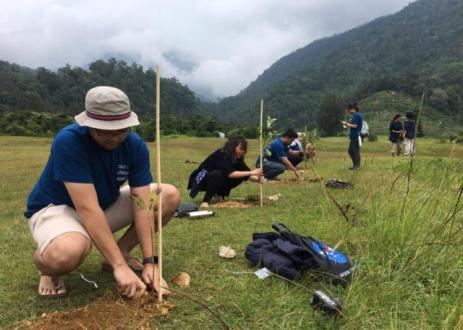Aplikasi Nol Emisi Indonesia (EMISI): Metode Penghitungan Emisi Individu dari Makanan, Pakaian, Konsumsi Listrik, dan Sampah
Ringkasan
Catatan Teknis ini memaparkan metode penghitungan emisi yang akuntabel dan kuat, sehingga para pemangku kepentingan dapat dengan mudah menerapkannya ke dalam sistem atau platform, termasuk juga mengembangkan kalkulator emisi mereka sendiri.
Ringkasan Utama
Untuk sementara publikasi ini hanya tersedia dalam Bahasa Inggris.
Humans’ daily household activities—such as cooking, heating or cooling, and using electric appliances—accelerate the climate crisis and risk public health by producing substantial greenhouse gas (GHG) emissions and air pollutants. Meanwhile, a global survey emphasized that Indonesia is among the countries with the highest population of climate change deniers, at 18 percent (Hilman and Harvey 2019). Therefore, it is crucial to establish a locally relevant and practically accessible platform that can educate and empower Indonesians to mitigate their households’ contribution to climate change.
The Indonesia Zero Emissions Application (EMISI) was developed in 2020 to help the public and organizations easily calculate and track emissions associated with land transportation activity in Indonesia. However, a calculation method for household activity–based emissions in an Indonesia-specific environment is not yet available. Serving as technical guidance for EMISI, this Technical Note aims to extend the current EMISI platform’s calculator method beyond land transport emission and into household emissions, which includes consumption of food, clothing, electricity, and waste.
The EMISI application calculates food and clothing waste as the most common household waste types for short-to-medium time frames. A bottom-up approach is used to calculate the associated GHG emissions and/or air pollutants, resulting in personalized, science–driven, and trackable quantitative estimates. To ensure accountability and precision of calculations within EMISI, the methodology is adopted from the Intergovernmental Panel on Climate Change (IPCC). Emission factors used in the methodology are generated from various notable and peer-reviewed Indonesian and international studies.
Materi Tambahan
Proyek

Emission Reduction and Sequestration Initiative/Inisiatif Pengurangan dan Penyerapan Emisi (EMISI)
Kunjungi ProyekPlatform buatan Indonesia yang bisa membantu semua orang untuk mempelajari, memantau, dan ikut serta dalam aksi iklim.
Bagian dari Iklim
